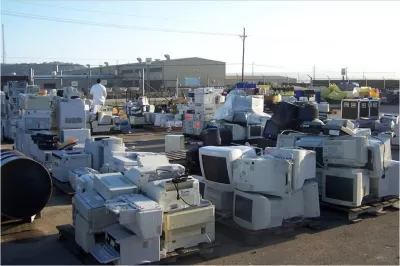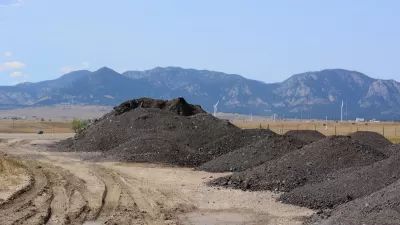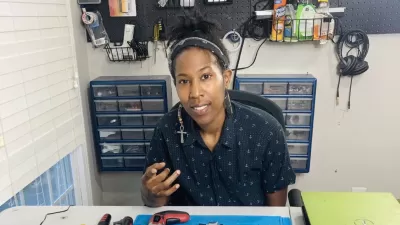When a watchdog group partnered with MIT to install trackers on a batch of e-waste, the results were sobering. Much of the haul left the country, ending up in Asian junkyards where unknowing workers are exposed to toxic substances.

Some hard facts, usually overlooked: "Dead electronics make up the world's fastest growing source of waste. The U.S. produces more e-waste than any country in the world. Electronics contain toxic materials like lead and mercury, which can harm the environment and people. Americans send about 50,000 dump trucks worth of electronics to recyclers each year."
This story for KUOW covers Seattle activist Jim Puckett, whose Basel Action Network recently "partnered with the Massachusetts Institute of Technology to put 200 geolocating tracking devices inside old computers, TVs and printers." The organization has released a video about the project.
According to Puckett's findings, many so-called recyclers in the United States are in fact exporters who don't care about what happens on the other end. "In a bear market for commodities, exporting waste is more profitable than processing it domestically. Recyclers simply fill a shipping container with whole electronics, and an e-waste broker arranges for pick-up."
In some cases, the conditions in developing world junkyards are deplorable. From the article: "Villagers desoldered circuit boards over coal-fired grills, burned plastic casings off wires to extract copper, and mined gold by soaking computer chips in black pools of hydrochloric acid."
Puckett's organization is named after the Basel Convention, an international treaty to prevent developed nations from dumping hazardous waste elsewhere in the world. The United States has not ratified the treaty, nor does it have any federal laws banning e-waste exports.
Of course, not all recyclers are engaging in this problematic activity: "Over the years Puckett's attempts to quantify and draw attention to exported electronic waste has drawn criticism from U.S. recyclers who say the problem has been exaggerated." But enough is going on to justify considerable environmental and human rights concerns.
FULL STORY: On the trail of America's dangerous, dead electronics

Planetizen Federal Action Tracker
A weekly monitor of how Trump’s orders and actions are impacting planners and planning in America.

The Simple Legislative Tool Transforming Vacant Downtowns
In California, Michigan and Georgia, an easy win is bringing dollars — and delight — back to city centers.

San Francisco's School District Spent $105M To Build Affordable Housing for Teachers — And That's Just the Beginning
SFUSD joins a growing list of school districts using their land holdings to address housing affordability challenges faced by their own employees.

In More Metros Than You’d Think, Suburbs are Now More Expensive Than the City
If you're moving to the burbs to save on square footage, data shows you should think again.

The States Losing Rural Delivery Rooms at an Alarming Pace
In some states, as few as 9% of rural hospitals still deliver babies. As a result, rising pre-term births, no adequate pre-term care and "harrowing" close calls are a growing reality.

The Small South Asian Republic Going all in on EVs
Thanks to one simple policy change less than five years ago, 65% of new cars in this Himalayan country are now electric.
Urban Design for Planners 1: Software Tools
This six-course series explores essential urban design concepts using open source software and equips planners with the tools they need to participate fully in the urban design process.
Planning for Universal Design
Learn the tools for implementing Universal Design in planning regulations.
Smith Gee Studio
City of Charlotte
City of Camden Redevelopment Agency
City of Astoria
Transportation Research & Education Center (TREC) at Portland State University
US High Speed Rail Association
City of Camden Redevelopment Agency
Municipality of Princeton (NJ)





























